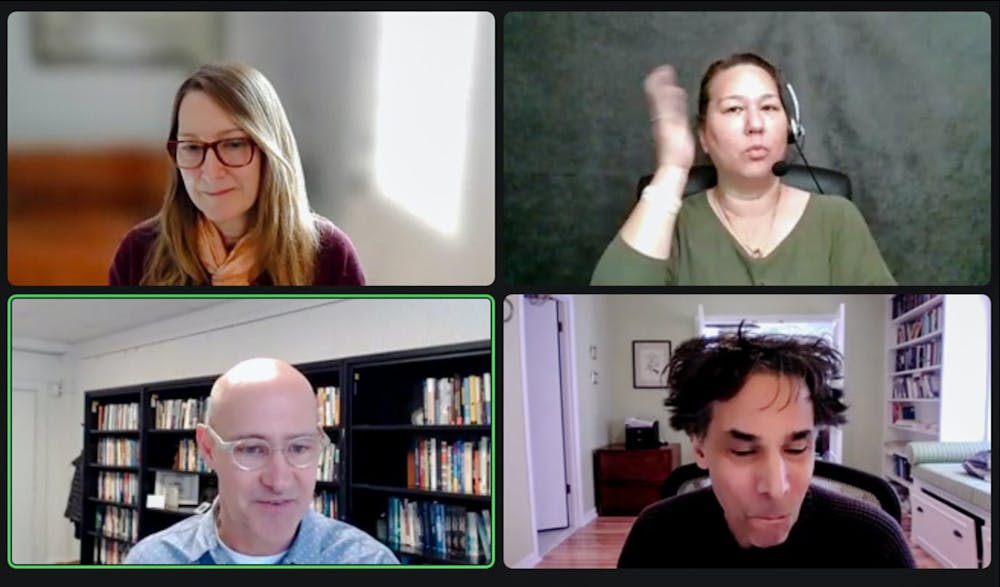Faculty across various departments discussed the complex intersections of climate and race during the “Race & Environment in America” webinar Tuesday. This was the penultimate webinar of the school year in the “Race & in America” series, which is sponsored by the Center for the Study of Race and Ethnicity in America and the Office of the Provost.
The event was moderated by Professor of Environment and Society and Sociology Scott Frickel, who fielded questions and led a discussion with Mark Cladis, chair and professor of religious studies, and Elizabeth Fussell, professor of population studies and environment and society.
While Cladis brought the literary arts of W.E.B. Du Bois and Leslie Silko into the conversation, Fussell focused on demographic data and sociological studies. The two professors combined to give an interdisciplinary look at how race and the environment are connected.
The intersection of race and the environment “is a topic that more and more of us at Brown are thinking about and paying attention to as the consequences of climate change and related ecological crises have begun to play out before our eyes,” Frickel said while kicking off the event.
“It’s hard to imagine two more important topics separately, and today we are bringing these two critical topics together,” Cladis said.
Cladis laid out three different ways he understood connections between nature and race.
The first is the “connection between subjugation of people of color and the land,” both of which have been “exploited by extractive capitalism, by greed, by cruelty and by racial and environmental prejudice,” Cladis said. The second link, according to Cladis, is how people of color are disproportionately impacted by “environmental toxicity.”
“In the US for example, African Americans are 75% more likely than white people to live in communities near industrial facilities that produce pollution (and) directly affect the health of local populations,” he said.
The third connection was how nature and the “more than human,” referencing feelings of spirituality, can be “a vital agent that supports communities of color and challenges racism,” Cladis said. “I know this may seem romantic to talk about the more than human as supporting communities of color but it is, to my mind, … a truth that should not be denied.”
Cladis discussed Silko’s fictional novel “Ceremony” set in the swamplands of Alabama, which focuses on Indigenous traditions of the Navajo and Pueblo tribes and details how a uranium mine created environmental hazards, threatening the health of those populations.
Cladis compared “Ceremony” to “The Souls of Black Folk” by Du Bois, which uses a swamp as an allegory for culture. “The southern, white culture sought to subdue both (non-white) bodies and swamplands jointly,” Cladis said.
Fussell also touched upon the meaning and impact of swampland and how interactions with the environment are intertwined with race. She discussed her experience living in New Orleans during Hurricane Katrina in 2005 and her subsequent research of the impacts.
Katrina “triggered a much larger disaster than it might have otherwise,” Fussell said. “The levees protecting the below-sea-level city failed in multiple places, and floodwater poured into the city faster than it could be removed.”
Black residents were more likely to live in the areas that had extreme flooding because of racist housing practices and historical settling practices, Fussell said. Unequal outcomes and harms after extreme weather events can be traced back to how systemic racism shapes the landscape of a city, according to Fussell.
“Social vulnerability to environmental hazards is socially constructed,” she said.
Previous installments in the webinar series have included “Race & Inequality” and “Race & Poetry,” The Herald previously reported.
“We're nearing the end of our second year of this wonderful series,” said Tricia Rose MA’87 PhD’93 P’14, professor of Africana studies, associate dean of the faculty for special initiatives and director of the CSREA. “We have, over the course of the past year and three-quarters, shared and featured research of dozens of Brown faculty members.”
The “Race & Performance in America” webinar on April 19 will conclude the series for this semester.

Katy Pickens was the managing editor of newsroom and vice president of The Brown Daily Herald's 133rd Editorial Board. She previously served as a Metro section editor covering College Hill, Fox Point and the Jewelry District, housing & campus footprint and activism, all while maintaining a passion for knitting tiny hats.





